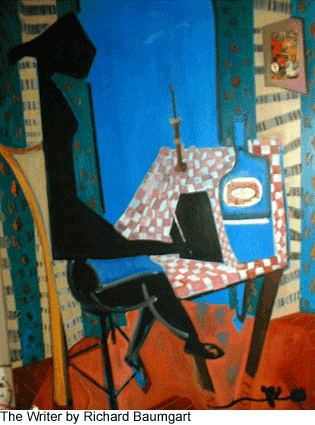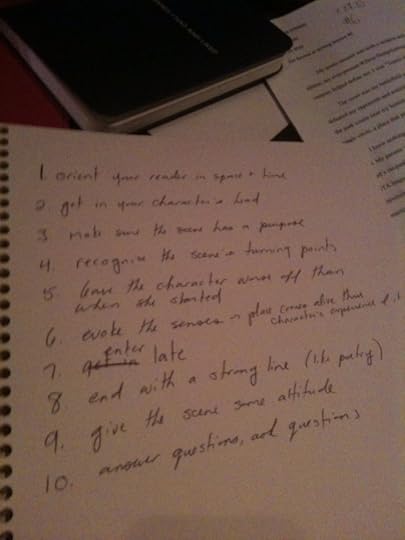Justine Musk's Blog, page 44
March 16, 2010
the dirty secret truth about talent — and how to grow it

1
A writing teacher told me that although it's easy for her to recognize the students with "talent", she's learned that it's impossible to predict who will develop and succeed as a writer and who will not (the "talented ones", she said, "tend to disappear and you never hear from them again").
She told me how she's witnessed students have "major breakthroughs" and, after years of struggle, suddenly start "writing at a publishable level" – students she never would have thought "had it in them...
March 12, 2010
5 ways to use minor characters to add depth and complexity to your protagonist
1. You can use different characters to bring out aspects of the protagonist you want to emphasize to the reader.
Minor characters who have been involved with the protagonist for a long time are carriers of their own history with and memories of the protagonist. Minor characters can reference the past in handy ways that serve the development of the story. They can make observations about the protagonist's character or predictions about her future.
Because minor characters are fully realized...
March 10, 2010
who is influencing you, and how? — three degrees of influence, your writing, and you

1
In his book Connected: The Surprising Power of Our Social Networks and How They Shape Our Lives, authors Nicholas Christakis and James Fowler examine the network effects that shape all of us. So many of our norms and behaviors hinge on what the people around us are doing, thinking and feeling — including whom we marry, how much money we make, and how thin we are (or aren't).
The "Three Degrees of Influence Rule" states that you are not just influenced by your friends, but also your friends' ...
March 7, 2010
the mysterious art that keeps your reader glued to every page

Few people know the ins and outs of fiction — and have a knack for explaining them — so well as uberagent Donald Maass. In his book "The Fire in Fiction" he dedicates a chapter to what he calls microtension.
A writer who masters the art of microtension keeps a reader glued to every page.
Very few writers, Maass points out, can actually do this.
Conflict is story, as every writer knows (and to those who say character is story, I say conflict reveals and deepens character and character drives...
March 4, 2010
the quality that makes your stories (and you) go viral

What makes a story go viral? In his blog post The Elements of Awe (check it out) Donald Maass draws your attention to a piece in the New York Times that describes how sociologists "have been studying data provided by The New York Times showing which of the paper's articles are the most often e-mailed".
Says Maass:
Their conclusions have some relevance for fiction writers because they reveal what it is about stories that probably generate word of mouth.
In his post (which promises to be the...
March 3, 2010
how to give yourself permission to write remarkable fiction

1
Call up a picture of your Ideal Reader in your head.
Write to (and for) that person and that person only.
Maybe your Ideal Reader is someone you know personally. Maybe your Ideal Reader is a person you compose from the materials of your imagination. Maybe your Ideal Reader is a mirror version of you.
2
So much of writing is about finding ways to give ourselves the permission that we need in order to write the book we want to write….not the book we feel we should write.
Write the book you want...
March 1, 2010
theme, Theme, your writing and you: stuff your teacher never told you
Since I'm busy working on a couple of things — including a free little ebook about writing like a bad girl — I'm cross-posting the below, which was originally at Storytellers Unplugged.

1
Perhaps theme gets a bad rap.
Its twin, Theme with a capital T, deserves all the potshots and ridicule and dressing-down that it gets. But if Theme is the pretentious dude decked out in Gucci and Prada who wears sunglasses at night and brags about how many thousands of dollars he dropped at his VIP table at...
February 27, 2010
8 things you need to know to write a gripping scene (and keep your reader hooked)

Ground your reader in space and time.
Imagine the reader as this ghostly presence hovering over your story, about to drift away….if you don't grab him and ground him deeply in your storyworld.
The reader needs to know where he is and whose head he is in. If you're telling a story in first-person, it's easy to turn too inward and rattle on about what that character is thinking and feeling. While a character's inner life is important, remember that his outer life is even more so. Ground t...
February 23, 2010
online audience development "crucial" to your future as a writer: not to worry about it is "bad advice"

In her blog, one writer urges other aspiring writers not to worry about establishing an online presence or building an author platform until they actually have a book to sell.
Jane Friedman, who oversees the Writer's Digest brand (the online community, the magazine, the books), thought it was so important to contradict this advice that she dedicated an entire blog post to it.
Jane doesn't use the term 'author platform' — and this is refreshing — but 'audience development'. I'm not sure this t...
how to make agents and editors love and adore you

In her blog, one writer urges other aspiring writers not to worry about establishing an online presence or building an author platform until they actually have a book to sell.
Jane Friedman, who oversees the Writer's Digest brand (the online community, the magazine, the books), thought it was so important to contradict this advice that she dedicated an entire blog post to it.
Jane doesn't use the term 'author platform' — and this is refreshing — but 'audience development'. I'm not sure this...



